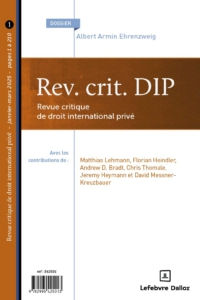Views
The Art. 2(b) CISG Conundrum: Are Tender Contracts Under the Ambit of an Auction?
Introduction
It is beyond dispute that The Convention of International Sales of Goods, 1980 (CISG) has facilitated international trade disputes. However, Courts and tribunals continue to apply their minds in adjudicating the applicability of CISG before advancing into substantive issues. This exercise is not very prolific as it prolongs proceedings. Chapter 1 of the convention lays down the scope and extent of the CISG. Amongst other things, the CISG application does not apply to contracts formed by, inter-alia, auctions under Art. 2(b) of CISG. The word auction itself is nowhere defined in the convention.
Japanese Court Enforces a Singaporean Judgment Ordering the Payment of Child Living Expenses
 I. Introduction
I. Introduction
Foreign family law decisions can be recognized, and where necessary, enforced in Japan if they meet the prescribed requirements for this purpose. Prior to 2018, it was an establish practice to apply the same recognition and enforcement regime used for civil and commercial matters to foreign family law decisions. However, discussions existed in literature regarding whether constitutive family law judgments and decrees should be recognized following the choice of law approach, or whether the specific characteristics of foreign family law decisions might justify exceptions, such as the non-application of certain recognition requirements (see Mario Takeshita, “The Recognition of Foreign Judgments by Japanese Courts” 39 Japanese Annual of International Law (1996) 59-61). Read more
The Development of forum non conveniens in the Chinese Law and Practice
by Arvin LUO Fuzhong, Doctoral Candidate at Tsinghua University, Visiting Research Associate at HKU, LL.M. (Cornell), Bachelor of Laws (ZUEL).*
The doctrine of forum non conveniens is an important principle in civil procedure laws and frequently applied by courts in many legal systems, especially those of common law countries. According to this principle, when courts exercise their discretionary power to determine whether to exercise jurisdiction over the factual circumstances of a case, they primarily consider issues of efficiency and fairness to find the most appropriate forum to settle the dispute. If the acceptance of a case would lead to inefficient outcomes and consequences that are contrary to justice, the court may refuse to exercise jurisdiction on the grounds that it is not the appropriate forum.
Unrealized by many international scholars and practitioners,[1] China has been adopting (formally or informally) the doctrine of forum non conveniens for more than 30 years, first through a few court judgments, then provided in judicial interpretations issued by the Supreme People’s Court of PRC (“SPC”), which is binding for all Chinese courts, and finalized in the 2024 Civil Procedure Law of PRC. This article introduces the history of Chinese law adopting the doctrine of forum non conveniens in the past years, and the development of China’s law revision in 2023. Read more
News
Call for Abstracts – Emerging Voices in Private International Law (Asser Institute)
Post prepared by Eduardo Silva de Freitas, PhD researcher Erasmus University Rotterdam and junior researcher at the Asser Institute
As part of its 60th anniversary celebrations, the T.M.C. Asser Institute invites abstracts for the panel “Emerging Voices in Private International Law”, to be held on 24 October 2025 in The Hague, at the conference Adapting Private International Law in an Era of Uncertainty.
The panel will feature two early-career scholars (PhD candidates or postdoctoral researchers) presenting original work in the field. Selected participants will also contribute to a forthcoming volume in the Short Studies in Private International Law series.
To apply, please submit a 400-word abstract and brief personal details by 15 August 2025 (24:00 CET) to: e.silva.de.freitas@asser.nl
Full call for abstracts: https://www.asser.nl/media/797989/call-for-abstracts_pil_asser.pdf
Revue Critique de droit international privé – issue 2025/1
 Written by Hadrien Pauchard (assistant researcher and doctoral student at Sciences Po Law School)
Written by Hadrien Pauchard (assistant researcher and doctoral student at Sciences Po Law School)
The first issue of the Revue Critique de droit international privé of 2025 has just been released. It gathers six contributions honouring Albert Armin Ehrenzweig and his legacy, as well as seven case notes and numerous book reviews.
The doctrinal part of the volume is devoted to the proceedings of the Albert Armin Ehrenzweig Conference organized in June 2024 at the University of Vienna, fifty years after the passing away of the great author. The contributions commemorate both the man and the scientist, testifying to the relevance of Albert A. Ehrenzweig’s scholarship to contemporary private international law. They are published in French in the printed version of the Revue (also available online here), and will be available shortly in English (here).
Out Now: Dickinson, Natural Justice in Recognition and Enforcement of Foreign Judgments, Recueil des cours, Tome 446
Last summer, Andrew Dickinson (Professor of the Conflict of Laws, University of Oxford, and former editor of ConflictofLaws.net) delivered a special course at the summer course of the Hague Academy of International Law entitled ‘Natural Justice in Recognition and Enforcement of Foreign Judgments’. It has now been published as Volume 446 of the Recueil des cours / Collected Courses.
The blurb reads as follows:
This special course assesses the utility of ideas of ‘natural law’ and ‘natural justice’ as tools to explain, rationalise and develop the rules governing the recognition and enforcement of foreign judgments currently applied by the world’s legal orders.
After introducing the topic, the first part of the course consider how influential 17th and 18th century accounts of the law of nature sought to account for the relations existing between all human beings, as well as the creation of political societies with law-making powers, the global ordering of those societies and the role of adjudication as a means of resolving disputes within and among them. This provides the historical and intellectual background for what follows.
The principal part of the course considers how writers on the conflict of laws in this period drew upon and utilised these ideas, as the rules that we apply today to regulate foreign judgments began to take shape. This leads to a study of the further evolution of the legal landscape in the 19th century, highlighting the use of natural law reasoning by judges and commentators to explain and justify the effectiveness of individual exercises of adjudicatory authority beyond their original domains, as well as the later rejection of natural law thinking in favour of models centred on ideas of sovereignty and territoriality, which continue to dominate today.
Having completed this historical survey, the course examines the specific legacy of natural law reasoning in the common law world, involving the use of principles of ‘natural justice’ to deny recognition of unjust foreign judgments, as well as the counterparts of these principles in other legal systems and international treaties.
Drawing on the preceding material, the concluding chapter considers the case for renaturalising the law in this area, and the implications of following this path.
More information on the book can be found here.
It is available to subscribers to the Recueil des cours here.


